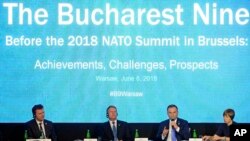Nine NATO nations on the alliance's eastern flank pledged Friday to cooperate more to increase their security in light of what they called an "aggressive" Russia that threatens their vision of a free, peaceful Europe.
Eight presidents and one parliament speaker held the third meeting of the Bucharest Nine, a group of nations once under the control of the Soviet Union. They created the forum after Russia annexed the Crimean Peninsula from Ukraine in 2014 and began supporting pro-Russia separatist rebels in Ukraine's east.
In a declaration, they cited Russia's buildup of conventional forces and hybrid warfare, which they said "threaten our long-standing vision of a Europe whole, free and at peace." They also mentioned "destabilizing actions and policies beyond NATO borders as well as on the Alliance territory," an apparent reference to the March nerve agent attack on a former Russian spy and his daughter in Salisbury, England.
During a public discussion, Czech parliament speaker Radek Vondracek expressed relief that his country — unlike some of the others — does not share a border with Russia.
But Romanian President Klaus Iohannis said geographic distances no longer offer strategic security, referring to the Salisbury poisoning.
"Of course, the Czech Republic is geographically not right near the eastern flank, but is Salisbury? So we see all of a sudden geography doesn't really matter," Iohannis said during a discussion organized by two think thanks, the German Marshall Fund of the United States and the Polish Institute of International Affairs.
"We have to keep in mind what the old tactics used to be, but nowadays there are absolutely different approaches," he said.
NATO Eastern Flank Members Pledge Closer Ties, Citing Russia

WARSAW, POLAND —



